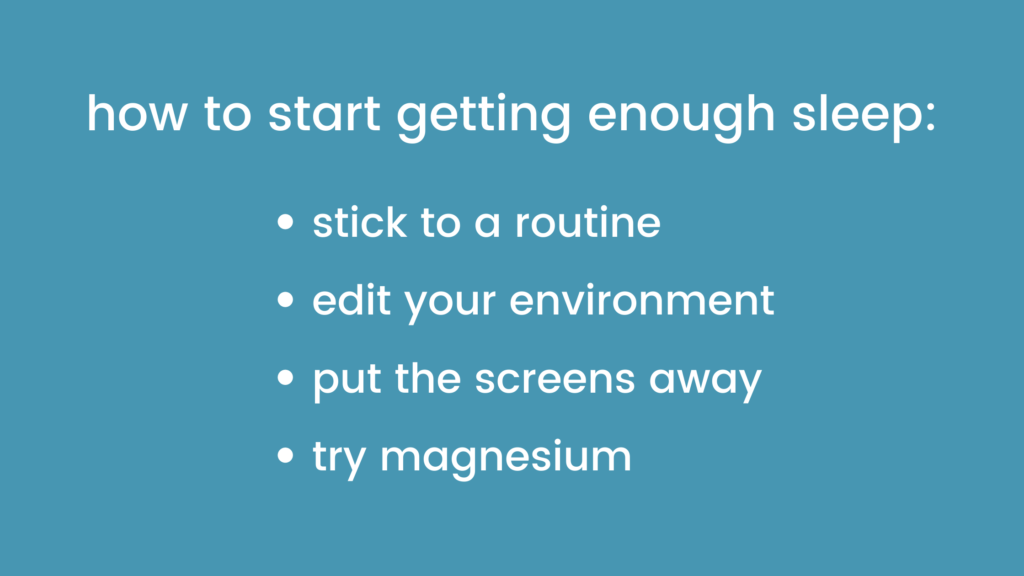
How Sleep Impacts your Hunger Hormones

Do you ever notice that some days you are wayyy hungrier than others, and you don’t know why? Well, it could be related to your lack of sleep the night before.
Americans are notorious for not getting enough sleep. The CDC states that 1 in 3 of us are not getting at least 7 to 8 hours of sleep per night on a consistent basis. The American Academy of Sleep Medicine and the Sleep Research Society recommend that adults get at least 7 hours of sleep per night in order to prevent many chronic diseases (diabetes, heart disease, high blood pressure, etc.) and poor mental health.
Not getting enough shut-eye isn’t just a matter of having enough energy to get through your day either. Truth is, it can actually impact several areas of your metabolism, including your hunger hormones.
This common combination of inadequate sleep plus unbalanced hunger hormones equals a decreased metabolism AND increased appetite. Not the ideal recipe when trying to lose weight.
Let’s talk more about what our hunger hormones actually are, how they are impacted by poor sleep, and steps to avoid this situation altogether.

What are the hunger hormones?
Two words: Leptin and Ghrelin.
Even if you’re not familiar with these hormones, you are definitely familiar with how they make you feel.
Ghrelin tells us that we are hungry. There are other hormones that tell us we are hungry, but this one does most of the talking. It’s secreted from our stomach lining and signals the brain that it’s time to eat. It often works in a cycle, rising and falling every 4 hours or so when we are awake.
It’s a common myth that those with a higher body weight have higher levels of ghrelin circulating in the body. It has actually been found that ghrelin levels are not higher just because more adipose tissue is present. However, the body is more sensitive to the hormone in general, in this case.
Leptin tells us that we are full. It decreases food intake and helps regulate energy metabolism. It is made by the fat cells in our body and works by suppressing the appetite in the brain.
We used to think that fat cells were just there for storage purposes, but we know now that there is a major connection to the endocrine system. What this means is that our fat cells produce many different hormones, leptin included, and will send messages out to the brain. The more fat cells we have, the more leptin we will have circulating.
And this makes sense when you think about it: the body wants to maintain how much fat we have stored. If we are accumulating more of it, the fat cells will send more signals to the brain that we are satisfied and less hungry (we don’t want to store more fat if we can help it).
However, this system can go off the rails if we aren’t sleeping enough, not eating PHFF, and many other factors we talk about in Metabolism Makeover. The body can also become leptin resistant when there is a significant amount of fat cells.
How does sleep affect our hunger hormones?
Before we look at the research, let’s understand why sleep and hunger hormones are related in the first place.
When a person sleeps, leptin levels are going to rise. Why? This tells the brain that everything is ok and the body has enough energy reserves for the next (hopefully) 7 to 8 hours of sleep. We typically do not wake up in the night ravenous, and this is due to leptin doing its job. Granted, if we aren’t eating enough, we could wake up hungry, but that’s a different discussion.
However, sleep deprivation is going to increase ghrelin and decrease leptin. This is a natural response simply due to being awake longer than anticipated. The body thinks we are going to need more energy for a longer day (even if we don’t really need more). Therefore, the brain responds to these signals and increases our appetite.
The research we have available to us strongly supports this connection and indicates that sleep can be a key regulator of body weight and metabolism. In other words, the link between appetite-regulating hormones is going to be affected by the amount of sleep we are getting.
It’s important to note that in the research, the association between sleep duration and hunger hormones was independent from BMI, age, sex, and other factors. This basically means that no matter who you are, inadequate sleep is very likely to impact those hunger hormones and appetite.
When we are referring to changes in hunger hormones, this specifically means that ghrelin was increased and leptin was decreased. This is the perfect storm of feeling hungrier all day and having a harder time feeling satisfied.
Another 2008 research study came to similar conclusions and interestingly stated that even one night of poor sleep was found to increase feelings of hunger. Results provided further evidence that sleep deprivation has a strong influence on energy metabolism and weight gain.
Finally, a recent 2020 systematic review did a deep dive into this connection between sleep and appetite. Findings were statistically significant (meaning the evidence was very strong) regarding lack of sleep and changes in leptin and ghrelin production.
How to start getting enough sleep:
If you aren’t too interested in looking at the research (it’s okay if you skipped the last section), just know that getting your 7-8 hours (9 if you’re a unicorn) is extremely supportive for your metabolic health and regulating those hunger hormones.
So here’s the thing: none of us are perfect. We are going to have nights where getting enough sleep is just impossible. We totally get it. However, we do want to encourage and empower you to consider some of these tips to start getting a little bit more sleep and move things in the right direction.

1. Stick to a routine
You might find it easier to fall asleep and wake up in the morning if you are consistent with your schedule. That next episode on Netflix can wait until tomorrow.
2. Edit your environment
Falling asleep can be easier if your environment is completely dark, on the cooler side, and quiet. Make some changes to support a restful place.
3. Put the screens away
Yes, you. Try putting your phone away or turn the TV off at least 30 minutes prior to bedtime. You might be seriously surprised by how much easier it is to get to sleep if you try reading for a little while in bed.
4. Try magnesium
Truth is, most of us are deficient in magnesium and this can lead to some serious sleep issues. If you want to try a supplement, we love this brand (use code MEGAN10 for $10 off!). Note that there are different forms of magnesium. Magnesium glycinate is absorbed and tolerated very well. Magnesium citrate can cause some gastrointestinal upset. It might take some trial and error to find a source of magnesium that’s best for you. You can also increase your magnesium from food sources. Think whole grains, leafy greens, beans, and nuts.
Give these ideas a try and work on increasing your sleep ASAP.
Hot take: prioritizing your sleep is just as important as the foods you eat to increase your metabolism.
Other ways to manage your hunger hormones:
Considering your sleep is not always going to be perfect at different points in your life, it’s okay and expected that you might feel hungrier the next day as a result. Here are things you can do to help manage those hunger hormones and not let things go completely off the rails.
1. Start your day with a high-protein breakfast
A breakfast packed with 20-30 grams of protein is amazing at turning off those hunger hormones and keeping you satisfied for at least 4 hours. On the flip side, a breakfast high in carbohydrates and minimal protein (a banana + iced coffee) is only going to keep you feeling hungry – or ravenous at that.
2. Eat regularly throughout the day
Going too long between meals (more than 5-6 hours) is only going to set the stage for feeling HANGRY. If your hunger hormones are already unbalanced, this is going to make overeating very hard to avoid when you do have your next meal. It’s ok to have a snack when needed!
3. Eat PHFF
Protein, healthy fat, and fiber are all amazing at shutting down hunger hormones. All of these take a longer time to digest and keep blood sugar stable, which also prevents strong cravings. New to PHFF? Check out this article.
Regular movement
Move your body! This might sound counterintuitive for hunger hormones, however, regular movement is known to increase satiety hormones and reduce leptin resistance. In other words, staying active and getting your steps in can help to regulate your appetite in a positive way throughout the day.
It would be recommended to avoid too many high-intensity cardio workouts throughout the week, as this will significantly increase your appetite. Not to mention, it is an added stress to the body (we don’t need 60 minutes of cardio daily). Give your metabolism some love with more non-stressful movements like walking, easy bike rides, cleaning the house, yoga, etc.
At the end of the day, continue to work on your sleep routine and don’t be surprised if you feel hungrier on days when you didn’t get your 7 hours at minimum. If you have a goal of weight loss, prioritizing sleep is essential in order to regulate your appetite, manage cravings, and overall feel your best physically.
If you need more support for your goals and you know you need accountability or expert guidance, check out the different ways we can help:
- 1:1 VIP coaching – check out the details here.
- Metabolism Makeover – get on the waitlist for the next round here.
- 60 Day Game Plan call – schedule a call here.
– Elle, MM Coach

